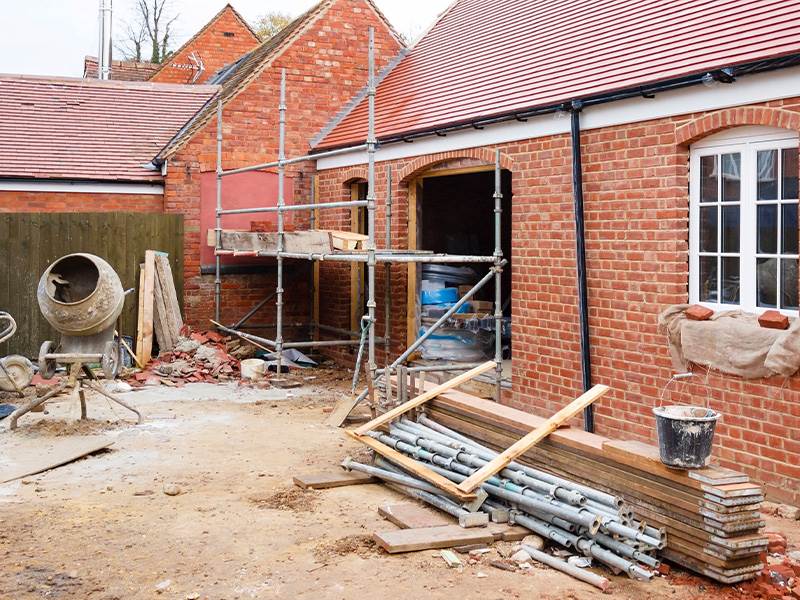Party Wall Surveyors
Easton Bevins surveyors have expertise in dealing with projects that fall under the Party Wall Act. We help ensure that work conforms to the rules of the act and resolve any issues that might occur with minimum fuss.
Anyone wanting to carry out work on a party wall, party structure or boundary wall must give the adjoining owner notice. If they do not serve notice they will have no legal rights to do the work.
Similarly, if the person planning notifiable works requires use of the neighbour’s land or any part of their property – such as to erect scaffolding – they will need to acquire rights under the act.
If you are planning any party wall work, or have been served notice of party wall works by a neighbour and are not sure what to do next, our expert surveyors can help.
For expert advice and support relating to the Act, including party wall disputes:
Call 0117 942 7876, email or complete
our enquiry form.
The Party Wall Act 1996
The Party Wall etc Act 1996 was created to help prevent or resolve disagreements relating to work carried out on party walls and boundary walls, and excavations done near a neighbour’s building.
You can download the Government’s explanatory booklet for further information.
Download booklet
Although sometimes viewed as unnecessary red tape, serving notice is required by law if you want to carry out work on a party wall, party structure or boundary.
Serving notice can also provide advantages which you do not get with the common law position, such as access for implementing the work. In some instances, you may be able to oblige the neighbour to contribute towards the cost of the works, for example if it is a shared wall that is in poor condition.
But fundamentally it is designed to be useful for both parties, allowing the person doing the work to get the work done, and protecting the neighbour from unnecessary inconvenience and damage. It does not have to be complicated; if you get consent, you can get on with the work; if there is a dispute it can be resolved quickly and easily by putting the right paperwork in place.
If you have any questions about party walls, view our frequently asked questions or get in touch with one of our expert surveyors today.
Party wall disputes v. boundary disputes
Party wall disputes are sometimes confused with boundary disputes but the two are very different.
Find out more about party wall disputes:
Read more
Boundary disputes have become a more common occurrence in recent times due to the increase in property prices and land values.
If you think that someone has encroached on your land, that would be classified as a boundary dispute and cannot be dealt with under the Party Wall Act. Easton Bevins has boundary experts specialising in this complex area. We can also provide expert witness services if required.
Find out more about boundary disputes:
Read More
Party Wall Act - The Process
Stage 1
If you are planning work on an existing party wall you need to give two months’ notice. If you are planning on excavating or building a new wall at the line of junction you need to give one month’s notice.
If you do not give notice your neighbour has the right to serve an injunction which will stop all work while a resolution is reached.

Stage 2
Once notice has been given, your neighbour will have three options.
i) consent to the works
ii) dissent to the works and you both agree to appoint one surveyor to act for both parties to resolve the matter
iii) dissent to the works and appoint their own surveyor, so a separate surveyor working for each party

Stage 3
If the neighbour does not consent, The Party Wall Act considers this to be a party wall dispute which must be resolved by way of a party wall award.
What is a party wall award?
The award is a legal document that governs certain aspects of the works such as timings, working hours, and potentially detail of the works.
Pre-works condition schedule
A pre-works condition schedule is required as part of a party wall award, and is considered good practice even in the event of consent. The schedule provides a record that can be referred back to in case of any damage during the works and serves to protect both parties – the person doing the work and the neighbour.
An award is legally binding, however both sides will have 14 days to appeal the award in the County Court.

Party Wall Act – Developers
The Party Wall Act also applies to property developers when extending or repurposing buildings that are situated alongside other existing buildings, or when building new property developments where there are existing neighbours.
Notice also needs to be served on any site where building work is being carried out within three metres of a neighbour, and in some instances, this can expand to six metres.
At Easton Bevins we work with many developers to help assess and manage any implications relating to the Act for their developments. Our experienced party wall surveyors can offer expert advice and guidance relating to the Act and help ensure compliance with the rules of the Act. In fact, many developers now simply send us their plans so that we can review where the Act might apply, and then manage the whole process on their behalf.

Complying with Party Wall rules
There is now a far greater awareness of the Party Wall Act. More established building contractors fully understand the importance of complying with the rules of the act. Also, anyone applying for planning permission will be reminded to check whether the Act applies.

Unfortunately, smaller building projects carried out under permitted development often don’t require planning permission so there is no reminder.
In addition, there can be a perception that the Party Wall Act is an obstruction and some contractors carrying out smaller works either do not understand the act, or simply do not see it as relevant or necessary, putting projects and people at risk.
What to do if a neighbour starts work on a party wall without serving notice
Often a good first option is to politely point out the oversight and ask them to stop work and serve notice, this usually achieves the desired result.
What to do if a neighbour carries on with the work without an agreement
If this does not work, you can apply for an injunction to stop the work. An injunction could delay a project by anything from one month to six months, or more. If a builder has already started work, they will probably continue to charge after it has been stopped. Also, if any damage has been caused, significant fines may be incurred.
If you have any questions about party walls, view our frequently asked questions or get in touch with one of our expert surveyors today.
Get professional advice before things escalate.
Getting a professional involved can help take the emotion out of a situation. Remember, the Party Wall Act is to everyone’s advantage and in our experience, in the majority of cases a resolution is without the need for costly legal battles.
Get Party Wall advice from the experts
If you are planning any work that falls under the Party Wall Act, or have been served notice of works by a neighbour and are not sure what to do next, our expert party wall surveyors can help.
We help home owners, neighbours and property developers with their party wall requirements.
Whatever the situation, professional advice from our expert surveyors will help ensure compliance with the rules of the act. Also, should there be a dispute, it can usually be resolved quickly and easily by putting the right paperwork in place.
Fees for support with the Act start from as little as £150, so it really does make sense to do things properly from the start.
Our experts
Michael Bull
Head of Block Management
With many years’ experience Mike has particular expertise in working on projects that fall under the Party Wall Act. Mike also offers expert witness services and has worked on numerous high-profile cases.
Richard Sherwood
Chief Operating Officer
As an expert party wall surveyor Richard works with both home owners and commercial clients to help ensure compliance with the act. Richard is also retained as a party wall surveyor for a number of national developers.
Ben O’Brien
Chief Executive Officer
Ben is an experienced party wall surveyor and has worked on numerous projects helping both developers and home owners manage compliance.
Party Wall News
Retrofitting and the Party Wall Act
Posted 26 January 2024 By Easton Bevins
To retrofit is to add new features or technology to an existing building to improve its performance, efficiency, or functionality. It often involves working on, or near to, a shared wall or boundary...
Read moreWhat is the role of a party wall surveyor?
Posted 26 September 2023 By Easton Bevins
You are most likely to encounter a party wall surveyor when renovating or extending a property. Whether you are the property owner, a developer, or a neighbour, it is important to understand the role...
Read moreDebunking Common Party Wall Myths
Posted 26 April 2023 By Easton Bevins
However small a building project might seem, if the planned work falls under the Party Wall Act, it is crucial to follow the correct procedures to avoid falling foul of the regulations.
Read moreLocal party wall surveyors
We have offices offering party wall services throughout the UK:
For more information about party walls, view our FAQs
For more information about party wall disputes, view our party wall disputes page
Get in touch
For more information please complete the enquiry form below and a member of our team will be in touch.
Fields marked * are required.
